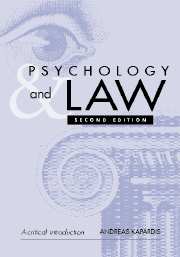Book contents
- Frontmatter
- Contents
- List of case studies
- Acknowledgements
- Foreword
- 1 Psycholegal research: an introduction
- 2 Eyewitnesses: key issues and event characteristics
- 3 Eyewitnesses: the perpetrator and interviewing
- 4 Children as witnesses
- 5 The jury
- 6 Sentencing as a human process
- 7 The psychologists as expert witnesses
- 8 Persuasion in the courtroom
- 9 Detecting deception
- 10 Witness recognition procedures
- 11 Psychology and the police
- 12 Conclusions
- Notes
- References
- Author index
- Subject Index
4 - Children as witnesses
Published online by Cambridge University Press: 05 December 2011
- Frontmatter
- Contents
- List of case studies
- Acknowledgements
- Foreword
- 1 Psycholegal research: an introduction
- 2 Eyewitnesses: key issues and event characteristics
- 3 Eyewitnesses: the perpetrator and interviewing
- 4 Children as witnesses
- 5 The jury
- 6 Sentencing as a human process
- 7 The psychologists as expert witnesses
- 8 Persuasion in the courtroom
- 9 Detecting deception
- 10 Witness recognition procedures
- 11 Psychology and the police
- 12 Conclusions
- Notes
- References
- Author index
- Subject Index
Summary
‘…Scientific truth … must come about by controversy … Without fighting you get science nowhere …’ (Boring, 1963:68).
‘Children have a right to justice and their evidence is essential if society is to protect their interests and deal effectively with those who would harm them.’ (Jack and Yeo, 1992)
‘To permit adult witnesses to relate children's unrecorded hearsay from investigative interviews is to tolerate listener distortion, foster professional ineptitude, and again to frustrate justice.’ (McGough, 1995:385)
‘The demonstrable fact that investigative interviews with young children can be rendered worthless by inept practice should not blind us to the substantial literature demonstrating that reliable information can be elicited from young children who are competently interviewed, however.’ (Lamb et al., 1995:446)
‘ … Despite the rhetoric, consistency in findings is not always present, … in the fields of stress and arousal, suggestibility, and misleading information, … there is scope for methodological developments which could serve to further empower the child within the criminal justice system.’ (Clifford, 2002:334)
Introduction
Psycholegal research into children as witnesses has a history going back to the beginning of the twentieth century (Binet, 1900). Since the 1970s there has been an increasing interest in western countries in victims of crime, especially sexual abuse. Since the 1990s there has been an alarming increase in the number of sex crimes against children that are reported to the police (Sedlak and Broadhurst, 1996; US Bureau of Census, 1994).
- Type
- Chapter
- Information
- Psychology and LawA Critical Introduction, pp. 95 - 125Publisher: Cambridge University PressPrint publication year: 2002



